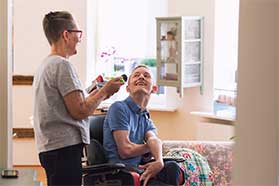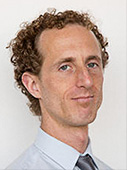Cerebral Palsy Treatment in Van Nuys, CA

As the most common form of childhood disability—afflicting over 700 thousand individuals in the U.S. alone—cerebral palsy (CP) is a neurological condition affecting movement, muscle tone and posture which is caused by damage that occurs to the developing brain, most frequently preceding birth. Cerebral palsy is associated with impaired and involuntary movement—including abnormal reflexes, floppiness or rigidity of the limbs or trunk—as well as abnormal posture, unsteady walking or some combination of these.
Those afflicted with cerebral palsy may experience a number of problems including those which affect their ability to swallow or focus their eyes. Due to muscle stiffness, cerebral palsy-afflicted patients may also experience reduced range of motion at various joints of their bodies. The severity of cerebral palsy varies widely, with some patients unable to walk at all, while others retain some mobility; too, some may experience near-normal intellectual capacity, while others suffer intellectual disabilities.
While incurable, various treatments and therapies exist to help manage cerebral palsy to help increase independence and improve the person's overall quality of life. To schedule a consultation with a qualified healthcare provider in Van Nuys that specializes in cerebral palsy treatment, call (424) 365-1800 or contact Dr. Jeremy Fischer online.
Types of Cerebral Palsy
There are four types of cerebral palsy:
- Spastic cerebral palsy is considered the most common type of cerebral palsy which causes stiffness and movement difficulties. There are 3 different types of spastic cerebral palsy: spastic hemiplegia (stiffness on one side of the body), spastic diplegia (muscle stiffness affecting the lower limbs) and spastic quadriplegia (stiffness in the legs, arms and body).
- Athetoid or dyskinetic cerebral palsy is the second most common type of cerebral palsy, not typically affecting intelligence but potentially causing muscle problems which affect the entire body, causing random and uncontrolled body movements. Afflicted children may experience difficulties walking, sitting, maintaining posture and speaking clearly due to lack of control of the tongue and vocal cords. Too, difficulties controlling facials may occur, causing drooling.
- Ataxic cerebral palsy is a form of cerebral palsy which causes difficulties with balance, posture and depth perception. Fine motor skills are often impaired, making activities requiring hand-eye coordination difficult.
- Hypotonic cerebral palsy is a form of cerebral palsy resulting from an injury to the cerebellum. Muscle problems appear early, and the infant’s body and head are floppy.
Cerebral Palsy Causes
What causes cerebral palsy is typically an abnormality or disruption that occurs during the development of the brain, usually prior to birth. The precise trigger is usually unknown, though factors which may contribute to these developmental problems include:
- Gene mutations
- Maternal or infant infections
- Fetal stroke, a disruption of blood supply to the developing brain
- Traumatic head injury
- Lack of oxygen to the brain (asphyxia) stemming from difficult labor or delivery
Risk factors for cerebral palsy include:
- German measles (rubella)
- Chickenpox
- Cytomegalovirus
- Toxoplasmosis
- Syphilis
- Exposure to toxins
- Zika virus infection
- Factors related to pregnancy and birth, including breech birth, low birth weight, premature birth and Rh blood type incompatibility between mother and child
Cerebral Palsy Symptoms
Cerebral palsy symptoms vary greatly, though movement and coordination problems are often indicators of the condition. Often, it is when a child fails to meet important developmental milestones that parents first take notice. The most common symptoms of cerebral palsy include:
- Variation in muscle tone, presenting as either stiffness or floppiness
- Stiff muscles and exaggerated reflexes (spasticity)
- Stiff muscles with normal reflexes (rigidity)
- Lack of muscle coordination (ataxia)
- Tremors or involuntary movements
- Slow, withering movements (athetosis)
- Delayed motor skills
- Swallowing or sucking difficulties
- Drooling
- Gastrointestinal issues
Cerebral Palsy Diagnosis
If cerebral palsy is suspected, your healthcare provider will conduct a physical examination as well as review the child's medical history and reported symptoms. A specialist trained to treat children with brain and nervous system conditions (pediatric neurologist) may be referred. In order to confirm a cerebral palsy diagnosis, your healthcare provider will likely recommend brain-imaging to reveal areas of damage or abnormal development, which could include:
- Magnetic resonance imaging (MRI)
- Cranial ultrasound
- Electroencephalogram (EEG)
Your healthcare provider will also likely recommend laboratory exams to screen for genetic or metabolic problems. Additionally, tests to assess cerebral palsy-affected body parts are likely to be recommended and may identify:
- Vision impairment
- Hearing impairment
- Speech delays or impairments
- Intellectual disabilities
- Movement disorders
- Developmental delays
Cerebral Palsy Treatment
Cerebral palsy is a life-long condition requiring long-term care from a medical team trained to coordinate your child's care. Treatment varies for each child and must be tailored to their unique health needs to help the child thrive more independently. Your child's cerebral palsy treatment plan could include:
- Surgery
- Braces
- Speech therapy
- Occupational therapy
- Physical therapy
- Medication
- Nutritional counseling
While there is no cure for cerebral palsy, it is not progressive, meaning it does not worsen or change over time. With proper treatment, most children diagnosed with cerebral palsy go on to live long, happy lives. If you suspect your child may be suffering from a neurological condition such as cerebral palsy, seek treatment today. Call (424) 365-1800 or contact Dr. Jeremy Fischer online.
Vitality Integrative Medicine
Address
4849 Van Nuys BlvdSuite 104
Sherman Oaks, CA 91403
(424) 365-1800
www.vitalityintegrative.com
Hours
Mon:
8:00 am - 6:00 pm
Tue:
8:00 am - 6:00 pm
Wed:
8:00 am - 6:00 pm
Thu:
8:00 am - 6:00 pm
Fri:
8:00 am - 6:00 pm
Sat:
8:00 am - 12:00 pm

